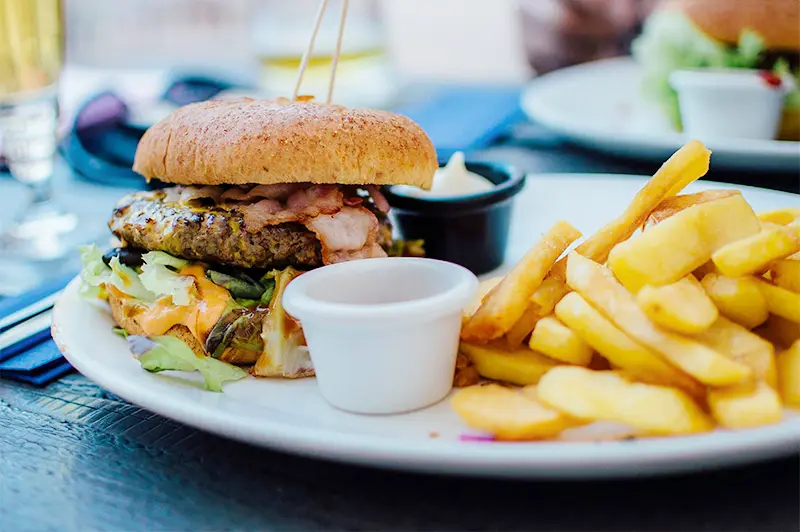Junk food comprises foods high in dietary fats, sugar, salt, or those that are nutritionally inappropriate. Most of the ultra-processed foods (foods that are commercially prepared by mixing several ingredients and adding additives such as sugars, flavours, and colours) are junk foods, as they are either nutritionally poor or high in sugar, salt, or fat. Sugar-sweetened beverages, carbonated drinks, and caffeine-containing drinks are also categorised as unhealthy foods under the broad acronym JUNCS (junk foods, ultraprocessed foods, nutritionally inappropriate foods, caffeinated/colored/carbonated foods/beverages, and sugar-sweetened beverages).

Children and adolescents should avoid consumption of foods and beverages classified as JUNCS, as far as possible. Alternatively, limit consumption of these foods at home or outside to no more than one serving per week, not exceeding 50% of the total daily calorie requirement for that age.
Commonly consumed junk foods.
- Ultra-processed food: packaged breakfast cereals, ready breads, instant noodles, commercial ice creams and flavoured yoghurts, margarine, milk supplements, packaged snacks, and chips.
- Restaurant food: pizzas, burgers, French fries, noodles, and pastas.
- Beverages: carbonated drinks, fruit drinks (packaged juices with added sugar), flavoured drinks, energy drinks, and sugar-sweetened beverages.
How is junk food harmful to the body?
Junk food can be harmful in many ways; some problems may appear early and others in due course.
- Most of these foods have poor nutritional quality due to their high carbohydrate and fat content. Most of them are high in sugar or salt as well. On the contrary, they are low in proteins, vitamins, minerals, and other micronutrients. This nutritionally imbalanced diet often leads to rapid weight gain and obesity. As the intake continues over a longer duration, it may affect the lipid profile of the body, thereby predisposing to more severe illnesses such as diabetes, heart disease, and high blood pressure.
- Some of the additives used in ultra-processed foods may also increase the risk of cancer.
- Microbial contamination due to poor hygiene can lead to gastrointestinal infections such as diarrhoea, typhoid, and hepatitis.
- The high sugar content of junk foods and drinks may lead to dental caries.
- Food additives and colouring agents may cause allergies.
- Caffeinated drinks cause an increase in the heart rate and sometimes an abnormal rhythm of the heartbeat.
- Regular overconsumption of caffeinated drinks may cause psychiatric and sleep disturbances.
Tea, coffee, and energy drinks.
Tea, coffee, and energy drinks are basically caffeine-containing drinks. Often, children tend to take these drinks to stay awake and feel more energetic. However, excessive caffeine intake can lead to serious consequences, such as an increase in heart rate or an abnormal rhythm of heartbeats. It may also lead to other disturbances such as poor sleep, restlessness, anxiety, depression, and tremors. No caffeinated or carbonated drink should be consumed by children under the age of 5. In school-going children and adolescents, tea and coffee intake should be limited to a maximum of half a cup per day (100 ml), and in 10–18-year-olds, one cup per day (200 ml), provided no other caffeinated products (cola and chocolates) are being consumed. Caffeinated energy drinks are a strict no-no for all children and adolescents.

purchase enclomiphene generic is it safe
discount enclomiphene generic health
prix walmart pour kamagra
petit prix kamagra du canada
buy cheap androxal cheap trusted
online order androxal cheap genuine
purchase flexeril cyclobenzaprine generic alternatives
get flexeril cyclobenzaprine medication interactions
online order dutasteride generic discount
cheap dutasteride generic online uk
cheapest buy fildena generic canada no prescription
get fildena generic online uk
buy cheap gabapentin canada fast shipping
online order gabapentin no prescription usa
itraconazole online with no perscription or membership
order itraconazole generic overnight delivery
ordering staxyn cheap melbourne
staxyn from canada
online order avodart cheap prescription
how to buy avodart cheap prescription
cheapest buy xifaxan uk pharmacy
get xifaxan generic version
online order rifaximin cost on prescription
cheap rifaximin australia discount
kamagra cena v kanadě
zdarma kamagra